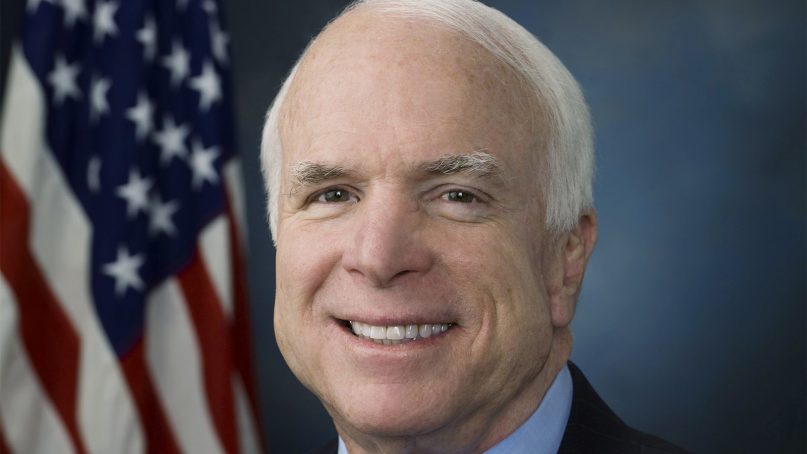John McCain was a war hero; a man who endured unspeakable agonies as a prisoner of war; a distinguished United States senator; a presidential candidate.
He was, from all accounts, a gentleman; a man of great humor; a mensch.
Even though I didn’t always….
Whew. I just stopped myself from writing that.
Because that seems to be the dominant theme on my Facebook feed over the past two days. My friends and colleagues have lauded his achievements and character — usually, however, preceded by the disclaimer “although I didn’t always (or: never) agreed with his political positions….”
As a card-carrying liberal (see? I’m doing it as well!), I find this problematic.
So does my friend and colleagues, Rabbi David-Seth Kirschner of Temple Emanuel in Closter, New Jersey.
On his own Facebook page (I quote him with his enthusiastic permission), Rabbi Kirschner writes:
Why do so many people feel the need to state as a disclaimer….”though I didn’t with all of his politics/policies”…Is there any politician that we agree with everything they say? Is it because we are afraid that we will be associated with the “wrong” political affiliation by memorializing him lovingly?
Rabbi Kirschner is on to something. The disclaimer is not only the fear that we will be “tainted” with the wrong political association. It is also a form of virtue signalling, of moral preening.
Because Rabbi Kirschner is correct about one other thing. With which politicians are you going to agree all the time?
With whom — at work, at home, in your family, in your life — are you going to agree all the time?
Imagine going to a funeral. The clergy person gets up and says: “Even though Mr. Rosenheimer had the following faults, flaws, and failings (which he enumerates at length), nevertheless we should admire him and we should thank God that he lived among us.”
By the way, this happened when we marked Israel’s seventieth birthday this past summer. I am thinking of all the hemmed and hawed good wishes to the Jewish state on her birthday: “Even though the occupation, the settlements, religious inequality, etc. etc. etc. (why not just do what the High Holy Day prayer book does, and put them in alphabetical order, and be done with it?), even still, happy birthday to Israel.”
Let me ask the question this way. Is this the way that anyone would act in everyday, private life?
Finally, the whole “even though I didn’t agree with him” thing is a powerful illustration of what is wrong in our country today.
Simply put: it is becoming increasingly difficult for people of one political persuasion to say something good, kind, or redemptive about those with whom they disagree — even passionately disagree.
Yes, there are limits. There were, by definition, no “good people” marching with the white supremacists a year ago in Charlottesville. Most of my readers would agree with that. Nor do I think that there are “good people” among Hamas supporters, throwing bombs.
Or, for that matter, “good people” among Israeli Jews who beat up Palestinians.
But, short of that: discounting the humanity of the other is part of the poison of our time. There will be no healing in this country, and in this world, as we continue to demonize the other.
As we approach the Days of Awe, let us resolve to engage in hakarat ha-tov — mentioning the good that people do.
There was so much in the life of John McCain that was good, decent, and holy.
Let us lift those elements of his story up, and let us turn them into a prayer.






